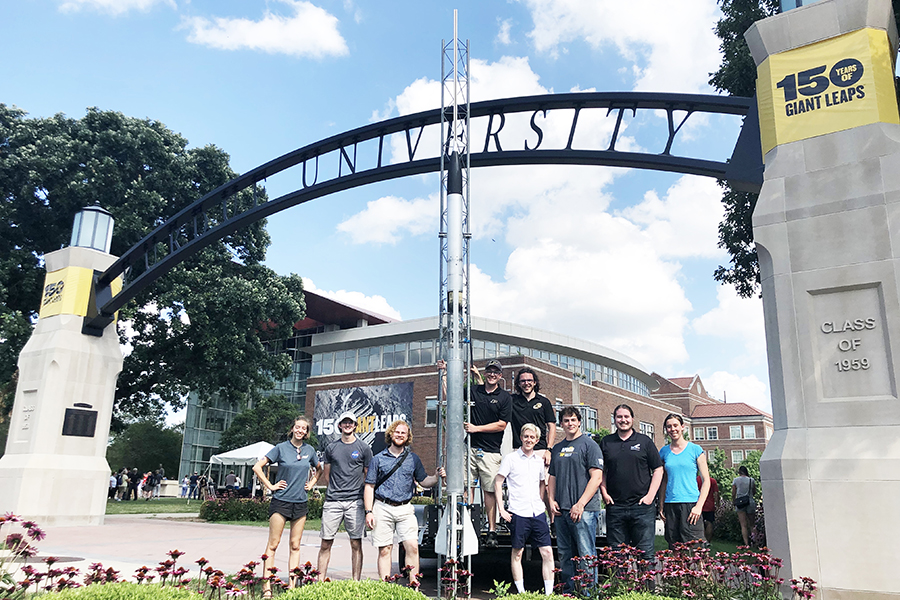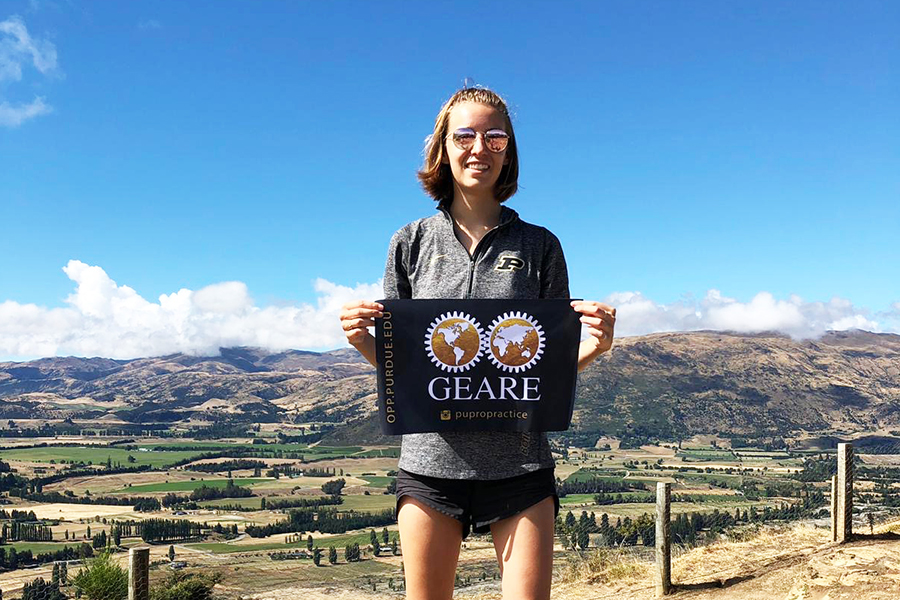Rocketeer Crosses Frontiers for Herself and Others

The first woman to lead a rocket project at Purdue University is guiding a big team of aspiring engineers toward a major competition and a soaring vision with earthly benefits. Emily Endicott, a senior in industrial engineering, will tell you her leadership role in the student organization called the Purdue Space Program (PSP) is not just about individuals’ aspirations. It’s grounded in a community spirit bold enough to broaden everyone’s horizons.
Sure, Endicott hopes a liquid-propelled rocket her team wittily labeled “Boomie Zoomie” will be launched before she graduates in May. And she manages about 60 fellow innovators in a “Boomie Zoomie-B” project determined to win the “FAR-MARS” cash prize in an intercollegiate contest next year. But these are parts of a grander story she has been living since she discovered fresh opportunities at Purdue—resources that led to expansive insights about a future worth sharing.
“I’m interested in making this rocketry experience into a way to better life on earth,” Endicott said recently, reflecting perspectives that took root during her first year on campus. “I was an Indiana girl who liked math and science,” directed by many people toward engineering studies at Purdue although the field was not top-of-mind in her family. The advice “ended up being a perfect fit for me.” Based on her early immersion in the College of Engineering, she gravitated toward industrial engineering “because I like operations and optimizing processes.” But the University’s academic and extracurricular assets, which she also explored with zeal, helped to point her path upward.
She had studied Spanish for several years, so she jumped at the chance for an internship in Peru—no small undertaking for a new undergraduate who had spent little time abroad. It was a transformative step into the College’s premier program for building one’s international competency, the rigorous Global Engineering Alliance for Research and Education (GEARE).
Endicott, glimpsing “what the world is actually like,” signed up for the supplementary curriculum of language, study abroad and cultural training, plus domestic and international research and design, which yields a Global Engineering Studies minor.

That was hardly the only new venture she pursued in her first year. She saw a pamphlet promoting the student rocket club and promising, “no experience necessary.” The extra chance for learning was another perfect fit, she quips, because “if you had shown me a SpaceX rocket, I couldn’t have told you which end was up or down.” But she attended meetings galore to absorb facts about aerospace engineering and internalize the PSP’s excitement. “I fell in love with it” and wound up a long-term member.
By the time Endicott reached the second half of sophomore year, her liquid-fuel rocket team was entering the “build phase” as it prepared for competition. She spent perhaps 90 hours that semester making rocket parts in the Bechtel Innovation and Design Center’s machine shop on campus. Meanwhile, she observed her teammates’ array of separate assignments coming together to add everything that enables flight. The diligence and multi-disciplinary talents of dozens in the PSP community, aided by faculty monitors but fully accountable for student-designed, student-built and student-tested outcomes, boosted her own energy level.
Then came junior year, with a heavy course-load in the first half and her required study-abroad semester for GEARE occupying the spring of 2019. That took Endicott away from the rocket project and placed her at the University of New South Wales in Australia.
Purdue provided a Semester Abroad in Intercultural Learning (SAIL) Scholarship through the University’s Center for Intercultural Learning, Mentorship, Assessment and Research to help support her throughout the calendar year.
She also benefited from frequent consultations with her Purdue-based mentor, Rhonda Haan, an internationally knowledgeable program assistant in the College’s Global Engineering Programs and Partnerships (GEPP) office. Haan “helped me take in my cultural experiences to integrate new challenges into my life priorities,” Endicott says.
Reflecting GEPP’s expertise in building global competency among engineers, Haan supported study-abroad students via conversations about their readings and discoveries. She remembers how Endicott “went above and beyond on her homework” and stepped out into the Australian culture to encounter communities in action.
Upon returning to Purdue for senior year last fall, rocketry beckoned. PSP leaders told Endicott they needed her talents as someone already well-versed with the liquid-fuel vehicle project. They invited her to manage that team. She accepted, thereby becoming the organization’s first female project manager.
With a different, prestigious tournament now looming in 2021, she currently oversees an important transition—building initial Boomie Zoomie know-how into tactics for Boomie Zoomie-B, or BZB, to triumph over other university teams. The Friends of Amateur Rocketry – Mars Society (FAR-MARS) rocket contest will award a $100,000 prize.
“I’m project manager of BZB, which entails propulsion, structures, avionics, fluid systems, the whole thing,” Endicott says, with her duties incorporating team coordination, teaching and outreach. Asked to reflect on what it means to be the first woman directing such an enterprise, she says being a role model is important to her. She has embraced the duty of bringing many PSP newcomers up to speed on the tasks and skills she started learning as a first-year student.
“Breaking the glass ceiling” matters, but her gender is not particularly an issue in such a close-knit, welcoming organization, she says. However, it is tied to the fact that most of her teammates are from the College’s School of Aeronautics and Astronautics, with only several hailing from mechanical or computer or industrial engineering, the latter being her major. Around the world, aerospace remains one of the most male-dominated engineering fields; if she faces any hurdle from others’ presumptions, it may be attributable to the “IE” label.
But that hardly overrides recognized talents, the community’s respectful ethos and caring friends. One of those friends is Haan, who has stayed in contact. Endicott is glad she can go to her former GEPP mentor and say, “Rhonda, I’m feeling down.” Now, they share cultural experiences at a different level: “We connect through being women.”
Haan says she sees the same outgoing confidence Endicott displayed in Australia and knows there’s a linkage to the awareness students gain abroad. “It gives everybody courage to go out and get what you want when you come back,” according to Haan. “Emily’s stepping out into a leadership role again. I’m just really proud of her.”
Indeed, Endicott has adopted among her leadership priorities the conveying of inspiration and resources to all the relatively new PSP members on a tough trajectory toward next year’s competition. Having known those first forays into a field she barely knew—a career area increasingly spotlighted in academia and world news— she says she readily cheers on, with gratitude, all the members of PSP who are “so gosh darn smart.” She also champions the sense of meaningful achievement, noting that goals of interplanetary travel are outweighed by multiple benefits space missions have already brought to everyday life on Earth.
There are still other compelling PSP functions, although Endicott makes time to conduct aerodynamic mechanics research at Purdue’s Maurice J. Zucrow Laboratories. This domestic work experience, one of the remaining components of her GEARE preparation for a Global Engineering Studies minor, is preparation for her next step after graduation in May. She wants to work in industry for a while before deciding on graduate studies. She has consistently participated in a core PSP tradition—traveling to local elementary and middle schools to kindle kids’ interest in space, engineering and rocketry. This evangelism is another way in which being a woman role model expands others’ dreams, she acknowledges.
And there’s one more personal sense of mission nurtured by Purdue’s support for global awareness and inclusiveness. This Indiana native would like to help address a less-noticed demographic factor in certain engineering sectors.
“It’s so cool that our American aerospace industry is made up of so many people who are not from America,” she says, noting there are several international students on her FAR-MARS team. Research organizations are especially welcoming as employers. But geopolitical security concerns make a person’s citizenship a restrictive factor for some of the jobs that help send rockets skyward.
Speaking as someone who literally hopes to launch that part of her career before graduation, Endicott hopes for a day when international tensions can give way to a more globally united rocketry community: “That’s the future of where I want to go.”
Written by: William Schmitt billgerards@gmail.com
